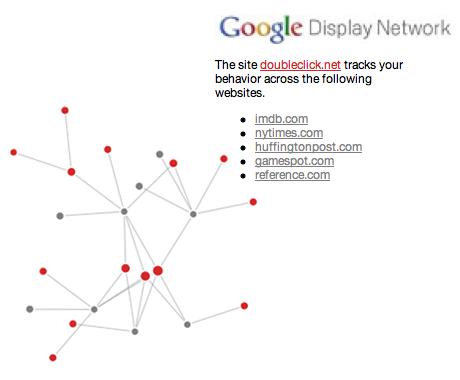In the new digital world, we are the sum of our trackable behavior. The web sites we read, the items we share, the products we buy, are all elements that contribute to our digital personas. Online marketers desperately want to collect our behavioral data so they can analyze our history, better target their offers, and maybe even predict our next moves. But the question remains, do we want them to have access? Do we trust their intentions? And, more importantly, if we don't, can we stop them from peering over our shoulders as we navigate our digital lives?
Today is a big day, when it comes to these questions of privacy, for both marketers and consumers, because on this day, March 1, Google is consolidating the data it collects from its separate product lines — such as YouTube and Gmail — into a master database, which will presumably provide the search giant with a much clearer picture of user habits.
It's hard to say definitively whether the outcome of this particular database consolidation will make us more or less exposed, but my feeling is that by setting this precedent, Google has struck a blow at privacy. This is the public end of our anonymity and marks the transition to a 21st century life where our personal data is wide open, whether we like it or not.
When we share a piece of our personal data with a particular company, part of the illusion of privacy is maintained by the fact that this company does not have access to all the personal data we've shared previously with other firms. The disturbing part of this act today by Google is the fact that they're breaking down the silos between their far-reaching services. Granted, Google owns all of these services now, but there was a time when YouTube and Picassa and Blogger were separate companies. It's hard to imagine that, someone signing up for any of these services, even five years ago, would have thought they would all be consolidated under one umbrella, when they first shared their personal information. Google does let users manage their profiles through its Dashboard and personal account settings, but this is far from foolproof, effectively the equivalent of letting someone into your house, and telling them not to look in certain rooms. All it takes is one mistake, and the control you thought you had over your personal data is gone. I disagree strongly with Hiawatha Bray of the Boston Globe, who states in his Tech Lab column today that "We are not facing a privacy apocalypse, despite changes in privacy policies, because every service offers some control for the informed user." While the privacy apocalypse may not be here today, Google is without a doubt, one of the horsemen, and the precedent the company has set with its database consolidation is significant. Now, you may argue that this is all academic and the damage done to any one person is minimal. After all, we're not sharing really sensitive items like medical information with Google are we? Well, at least, not anymore, as Google Health did shut down 9 months ago. Our last shreds of digital privacy are protected by the fact that information about us is being kept separately in the database silos of different corporate entities. I know that I don't want companies putting together all the different pieces of my digital self to discover more about me.
If the hubbub about Google's recent privacy changes makes us all that much more aware of our data life, it might be a good thing. On the internet, the product that most companies sell is, in fact, their users' data. All the "free" stuff, from articles to videos to social networks to applications comes at a price. And, we're just beginning to understand whether or not that price is one we want to pay. Right now there's a tremendous opportunity for designers and engineers, as security / privacy develops into a critical axis of the user experience.
While there are some options already available for guarding your privacy, they're not as robust or all encompassing as you'd think. Both Chrome and Firefox feature private browsing modes, but these are of limited in their helpfulness, at best. For instance, browsing in Incognito Mode in Chrome only keeps the browser from storing information about the sites you've visited. The Web sites themselves will still have records of your visit, and other Google services like Google Web History may also store your browsing data.

The Collusion extension for Firefox uses a node diagram to visualize user tracking data.
Browser add ons, like Ghostery, block ad tracker scripts and foil third party cookies. Ghostery, however, can break Web site code, as certain tracking scripts are tied to functionality like commenting. The HTTPS Everywhere extension for Firefox and Chrome from the Electronic Frontier Foundation encrypts your searches and some other interactions, but is limited in the services with which it works. And Collusion, currently only available for Firefox, provides a beautiful visual reference map, showing those entities tracking our steps across virtual space as a node diagram. Overall, though, these browser add-ons are half measures. As our lives have gone digital, it has become the consumers' responsibility to protect ourselves and escape the far reaching tentacles of our supposed benefactors. There's a big space to be filled with the right product that enables us to keep what we choose to keep to ourselves, private.